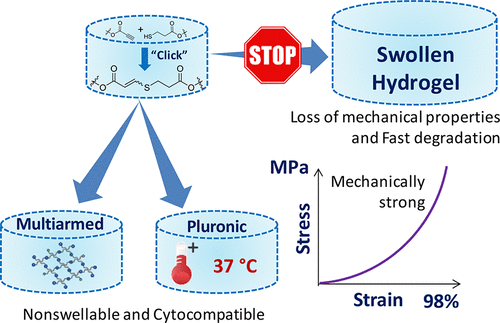当前位置:
X-MOL 学术
›
Biomacromolecules
›
论文详情
Our official English website, www.x-mol.net, welcomes your
feedback! (Note: you will need to create a separate account there.)
Nonswelling Thiol-Yne Cross-Linked Hydrogel Materials as Cytocompatible Soft Tissue Scaffolds.
Biomacromolecules ( IF 5.5 ) Pub Date : 2017-11-29 , DOI: 10.1021/acs.biomac.7b01204 Laura J Macdougall 1 , Maria M Pérez-Madrigal 1 , Maria C Arno 1 , Andrew P Dove 1
Biomacromolecules ( IF 5.5 ) Pub Date : 2017-11-29 , DOI: 10.1021/acs.biomac.7b01204 Laura J Macdougall 1 , Maria M Pérez-Madrigal 1 , Maria C Arno 1 , Andrew P Dove 1
Affiliation

|
A key drawback of hydrogel materials for tissue engineering applications is their characteristic swelling response, which leads to a diminished mechanical performance. However, if a solution can be found to overcome such limitations, there is a wider application for these materials. Herein, we describe a simple and effective way to control the swelling and degradation rate of nucleophilic thiol-yne poly(ethylene glycol) (PEG) hydrogel networks using two straightforward routes: (1) using multiarm alkyne and thiol terminated PEG precursors or (2) introducing a thermoresponsive unit into the PEG network while maintaining their robust mechanical properties. In situ hydrogel materials were formed in under 10 min in PBS solution at pH 7.4 without the need for an external catalyst by using easily accessible precursors. Both pathways resulted in strong tunable hydrogel materials (compressive strength values up to 2.4 MPa) which could effectively encapsulate cells, thus highlighting their potential as soft tissue scaffolds.
中文翻译:

不溶胀硫醇-Yne交联水凝胶材料作为细胞相容性软组织支架。
用于组织工程应用的水凝胶材料的一个主要缺点是其特有的膨胀响应,这会导致机械性能下降。然而,如果能够找到解决方案来克服这些限制,这些材料就有更广泛的应用。在此,我们描述了一种简单有效的方法来控制亲核硫醇炔聚乙二醇(PEG)水凝胶网络的膨胀和降解速率,使用两种简单的途径:(1)使用多臂炔和硫醇封端的PEG前体或(2) )将热响应单元引入 PEG 网络,同时保持其强大的机械性能。通过使用易于获得的前体,在 pH 7.4 的 PBS 溶液中,原位水凝胶材料在 10 分钟内形成,无需外部催化剂。这两种途径都产生了强大的可调节水凝胶材料(抗压强度值高达 2.4 MPa),可以有效地封装细胞,从而凸显了它们作为软组织支架的潜力。
更新日期:2017-11-10
中文翻译:

不溶胀硫醇-Yne交联水凝胶材料作为细胞相容性软组织支架。
用于组织工程应用的水凝胶材料的一个主要缺点是其特有的膨胀响应,这会导致机械性能下降。然而,如果能够找到解决方案来克服这些限制,这些材料就有更广泛的应用。在此,我们描述了一种简单有效的方法来控制亲核硫醇炔聚乙二醇(PEG)水凝胶网络的膨胀和降解速率,使用两种简单的途径:(1)使用多臂炔和硫醇封端的PEG前体或(2) )将热响应单元引入 PEG 网络,同时保持其强大的机械性能。通过使用易于获得的前体,在 pH 7.4 的 PBS 溶液中,原位水凝胶材料在 10 分钟内形成,无需外部催化剂。这两种途径都产生了强大的可调节水凝胶材料(抗压强度值高达 2.4 MPa),可以有效地封装细胞,从而凸显了它们作为软组织支架的潜力。











































 京公网安备 11010802027423号
京公网安备 11010802027423号